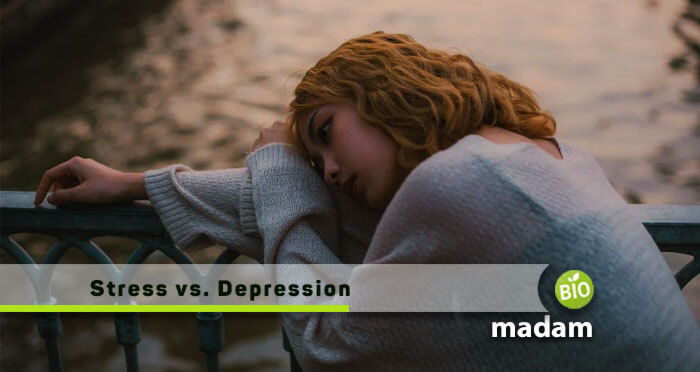Recently updated on October 5th, 2023 at 06:46 am
Whether it’s an important interview, a once-in-a-lifetime business deal, or a challenging school project, everyone may experience different levels of stress at some point in their lives. While stress may seem a problem that needs immediate treatment, it’s actually not the case most of the time.
Good stress motivates you to work harder and helps you finish your duties efficiently to reach your goals and dreams in life. In fact, stress is an essential factor to human survival, but too much of it can be extremely detrimental to the wellbeing of a person. It can be bad if it starts to put you down physically and emotionally, which may even lead to depression.
Depression is one of the most common and destructive forms of mental disorder that’s somehow shares similarities with stress. However, depression is a long-term issue that requires intensive and supervised care to save someone from drowning in darkness. If you or a loved one is suffering from depression, you may visit a rehab center, such as Jackson House, to get help.
In this article, you’ll learn the four simple ways to identify and differentiate stress from depression. Also, you’ll get to know the essential tips on managing the symptoms of stress and depression, and the possible treatment, including medications and therapies.
Know The Common Signs of Stress
As mentioned before, stress is a normal part of everyday life. It can help you become more motivated to do the things you need to do. However, too much stress may result in physical and mental conditions, such as high blood pressure, obesity, heart problems, and, of course, depression.
With that said, here are some warning signs that may help you manage and stop your stress from worsening:
- Having sleeping problems
- Feeling overwhelmed even with simple and basic tasks
- Having problems concentrating and focusing on completing tasks
- Memory problems
- Change in eating habits
- Not being able to function effectively and efficiently in class or at work
- Feeling burned out from doing tasks or schoolwork
- Feeling anxious and nervous
- Experiencing body pains and constant episodes of headaches
Furthermore, these symptoms are usually short-term and may be relieved by taking adequate rests.

Know The Common Signs of Depression
Depression is another mental problem resulting from intense pain and pressure from the environment. Unfortunately, it has the capacity to claim the lives of many people by drowning them in complete sadness. And, it’s the usual cause of all suicidal attempts and cases.
With that said, it’s important to act immediately at the start. However, it’s difficult to understand since most people are afraid to show their feelings to others. In that case, you have to look at the signs people might show.
Here are some common signs of depression that’ll help you determine when one is suffering from it or not:
- Constantly feeling sad, hopeless, and pessimism
- Having suicidal thoughts
- Always staring deeply at nothing
- Not being able to speak with other people properly
- Loss of interest and enjoyment to participate in life
- Being angry, irritable, and restless
- Abrupt changes in eating habits and weight
- Feelings of worthlessness, helplessness, and extreme guilt
- Having difficulties concentrating and remembering things
- Constant lack of energy
- Persistent sleeping disorders
Unlike stress, these symptoms are usually persistent and long-term. In that case, your best option would be to ask a mental health professional for help and start to get the treatment you need.
Know The Traits of Stress and Depression
Unlike depression, stress isn’t a mental condition or a problem. It’s a naturally occurring feeling that may help people achieve their goals in life. Usually, stress occurs because of the triggers in your life. These include your daily experiences at school, work, or home. Also, stress may be relieved in a day or two after receiving adequate rest.
On the other hand, depression isn’t a positive trait, unlike stress. It’s a mental condition that drowns its victim in deep sadness and hopelessness and has claimed many lives. And, unlike stress, depression may have no trigger and may occur at any time.
Also, it’s worth noting that even people who seem to have no problems in life may experience depression. In addition, studies show that an adult may experience an episode of depression at least once in their life. Therefore, it’s important to live a healthy life and avoid toxic environments to minimize the risks and chances of experiencing depression.
Identify The Link Between Stress and Depression
When someone is so stressed in life, they may experience some symptoms that lead to depression
There are two types of stress you might need to know about: acute and chronic.
Acute stress is caused by a temporary event, such as work problems, traffic jams, intimidating conferences, and interviews. This short-term stress may be relieved in a few days or after the event.
On the other hand, chronic stress is a problematic type of stress. It’s a feeling that nothing seems to be doing fine anymore, and it doesn’t seem to be easing up. It’s a long-term issue that often leads to depression.
Here are some common causes of chronic stress:
- Struggling with financial issues
- Having a serious family problem
- Constant suffering from violence and abuse
- Working at a high-pressure and toxic workplace
- Feelings of lack of emotional support from family and friends
Moreover, experts state that stress and depression can be bidirectional. It means that one can cause the other, or the other can cause the first. But, the key takeaway is that both can make each other worse.
What will be discussed below are other details you need to know, especially when you’re or a loved one is suffering from severe stress and depression. Read on!
How to Reduce and Manage the Symptoms of Stress and Depression?
If you’re suffering from stress and depression, you can take the necessary steps to reduce the symptoms on your own. With that said, here are the things you can do to bring your stress and depression to a healthy and non-active level:
Know What You’re Feeling Right Now
It’s a good thing to remember that depression and stress aren’t your faults. You’re not in control of your feelings and surroundings that may or may not trigger them. Also, their occurrence isn’t because you’re weak and unable to do the things you need to do.
These unwanted feelings are the main cause of distress. So, it’s important to know the underlying factors and triggers that you or anyone around you didn’t cause. Doing this will help you promote self-compassion instead of self-criticism and punishments.
Create a Schedule of Activities
Creating a daily routine will help you have a sense of control in your life, which may reduce feelings of stress and depression. Also, it allows you to have time for your self-care treatment. You can relax in a spa, do your groceries, pamper with a beauty routine, and do anything that could make you happy and relieved.
When creating a schedule, start by diving each day of the week into three stages: morning, noon, and evening. Then, list the things you can do in every stage throughout the week. If you can, try to do different things each day instead of doing the same things every day. This will help you achieve more things in life.
Have an Adequate and Quality Sleep
Whether you’re stressed or not, getting a good night’s sleep is essential for your health and wellbeing. If you’re not getting enough sleep every night, the symptoms of stress and depression may worsen. However, too much sleep may put your body, mind, and mood at risk, too.
According to experts, the recommended hours of sleep for an adult range from seven to nine hours for optimal and ideal wellbeing and health.
Eat Balanced Meals
Eating nutritious foods, such as whole grains, lean protein, fruits, vegetables, and other unprocessed foods, will not only help you get the nutrients you need but also reduce and improve your symptoms.
As much as possible, avoid food products that may worsen your symptoms, such as coffee and other caffeine-rich products, refined sugars, and other multi-processed foods. However, if you can’t remove them from your diet, then always incorporate them with nutrient-rich foods as much as possible.
Perform Daily Exercise Routine
According to experts, performing exercises at least 2.5 hours per week is an effective way to reduce the symptoms of stress and depression. These activities help your body produce dopamine and serotonin or the so-called ‘happy hormones,’ boosting and improving your mood naturally.
However, performing exercises while stressed and depressed isn’t easy and usually challenging. If this is your case, you may start by doing activities that don’t require much effort and movement, such as:
- Gardening
- Walking around the block instead of driving
- Jogging in the morning
- Hiking every weekend
- Biking around the streets
Furthermore, you may incorporate these basic movements into your daily routine and try to change them after some time.

Do You Need to Get Diagnosed?
If you’re feeling the symptoms of depression, which were discussed above, then you have to visit a mental health professional or other centers that specialize in treating depression and chronic stress.
Unfortunately, there are no tests and exams that can diagnose depression. However, you may be asked some questions that’ll help your therapist identify your condition and its severity. These include the timeline of symptoms and your insights on what you’re feeling right now.
Furthermore, it’s important, to be honest, and open to your therapist when you’re describing your feelings and symptoms. In this case, they’ll be able to help you better solve your problems and create a proper diagnosis.
What are the Possible Treatment for Stress and Depression?
There are many ways a therapist and medical professional may treat your condition. These may vary from therapies and other medications, but they’re usually used hand-in-hand during treatments.
Here are some details you might need to know about them:
Therapy
Therapy is the most common treatment procedure for people suffering from debilitating and detrimental mental conditions. For example, your therapist may use interpersonal therapy to help you communicate with other people without fearing anything. This will also help you express yourself positively and meet your emotional needs.
Other popular forms of therapy may include:
- Cognitive Behavioral Therapy: This focuses on identifying and changing thoughts and behavioral patterns.
- Problem-Solving Therapy: This therapy aims to improve one’s ability to cope with symptoms and challenges in life.
- Acceptance And Commitment Therapy: This focuses on helping people accept their condition and other distressing thoughts, stay mentally present, and take part in blissful activities that’ll help them reach their emotional needs.
- Mindfulness-Based Cognitive Therapy: This focuses on teaching people how to manage and accept the presence of unwanted emotions without getting overwhelmed by them.
These are just some of the forms that may help you combat depression. There are other more intensive treatment plans, depending on the severity of your condition.
Medications
Some medications may also help reduce the symptoms of stress and depression. However, they don’t address the root cause of your condition. In that case, you need to ask your doctor and discuss the medications you need alongside the right therapy.
Here are some that may be used to treat your condition:
- Antidepressants, including selective serotonin reuptake inhibitors or norepinephrine- serotonin reuptake inhibitors
- Anti-anxiety medications, such as beta-blockers and benzodiazepines
- Mood stabilizers
Final Words
Stress and depression are two different things. Unlike depression, stress may be rewarding and beneficial in most cases. It helps people boost their confidence and motivates them to do their jobs wholeheartedly and passionately. However, too much of it may result in chronic conditions that often lead to depression.
In addition, stress and depression may show similar symptoms. That’s why it’s important to look for these signs to help you address the possible conditions before they become worse. Also, you may follow some tips that’ll help you manage your stress and depression.
However, if the condition starts to overwhelm you, it’d be best to consult a medical professional immediately. It’s important not to waste time in such trying situations.

Hi, they call me Jenna, and I am also known for achieving a gold medal during my Ph.D. in science life. I always had a dream to educate people through my utmost writing hobby. So, I chose this blogging path, and Biomadam gave me this opportunity to present for them. I now stand to entertain you. Continue reading my articles & discuss if you’ve any confusion through the comment section below.

